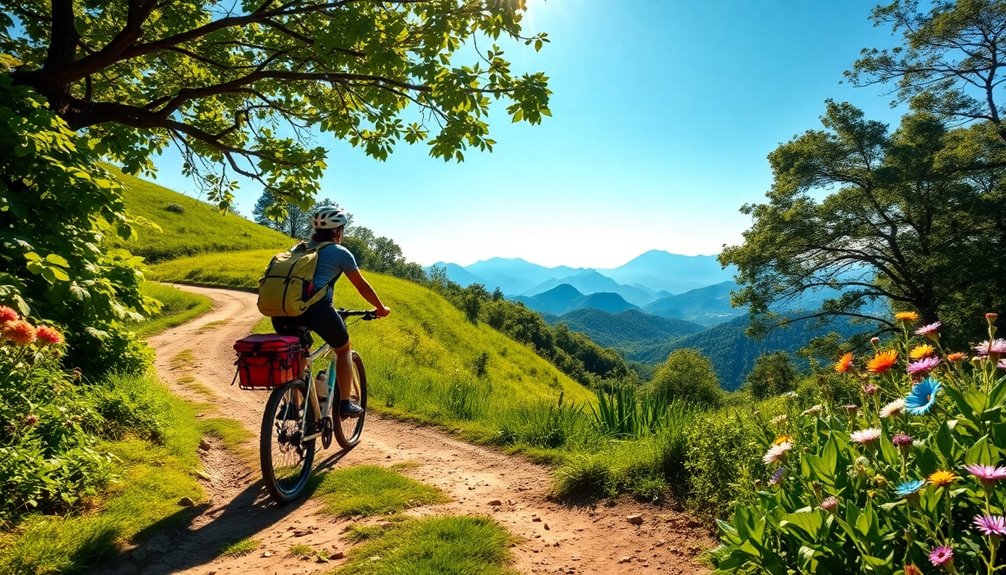Biking is a fantastic way to embrace eco-tourism and travel responsibly. You cut down on emissions, explore local cultures, and support small economies. Renting bikes helps reduce your ecological footprint while allowing you to enjoy diverse landscapes. Look for eco-friendly accommodations and engage with communities along your journey. By following sustainable practices, you can leave no trace and foster environmental stewardship. Keep going to discover more tips for creating an unforgettable eco-friendly bike adventure.
Key Takeaways
- Choose local destinations to reduce travel emissions and support local economies while exploring diverse landscapes and cultures.
- Rent bikes instead of buying to minimize ecological footprints and support community bike shops.
- Follow Leave No Trace principles to preserve natural areas and respect local wildlife during your biking adventures.
- Engage with local communities by supporting small businesses and participating in conservation projects to enhance your travel experience.
- Use sustainable practices like carrying reusable water bottles and biodegradable products to further reduce your environmental impact.
The Environmental Benefits of Biking for Travel

When you choose to bike for travel, you're not just enjoying the scenery; you're also making a significant positive impact on the environment. Biking produces zero operational emissions, drastically reducing your carbon footprint compared to cars, which emit around 404 grams of CO2 per mile.
Moreover, bicycles require only about 5% of the materials and energy used for cars, making them a sustainable transportation option. With cycling, you burn less than 50 calories per mile, minimizing energy consumption and environmental impact.
Additionally, biking alleviates traffic congestion, enhancing air quality in urban areas. By opting for a bike, you also support local communities and ecosystems, as bicycles have a minimal ecological footprint, preserving habitats while promoting healthier environments. Furthermore, solar-powered bike lanes can enhance the sustainability of biking infrastructure, demonstrating a commitment to renewable energy solutions in urban planning.
Choosing Local Destinations for Eco-Friendly Trips
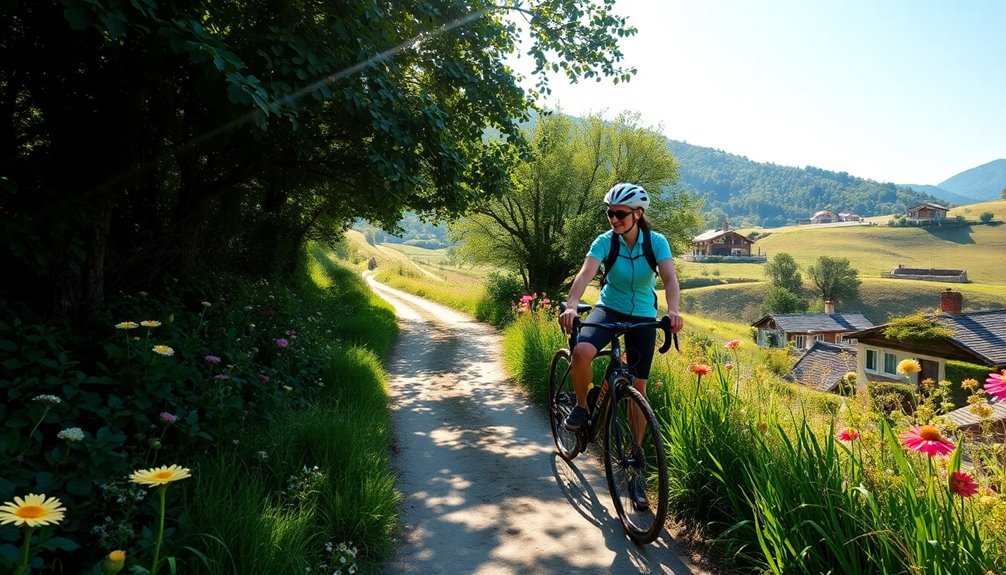
When you choose local destinations for your eco-friendly trips, you greatly cut down on travel emissions. Riding your bike allows you to explore diverse landscapes and connect with the culture around you in a way that traditional travel simply can't. Plus, by sticking close to home, you might discover hidden gems that make your trip even more rewarding. Additionally, opting for energy-efficient systems like heat pumps when planning accommodations can further enhance your commitment to sustainability.
Minimize Travel Emissions
Choosing local destinations for your bike trips not only enhances your adventure but also markedly cuts down on travel emissions. By minimizing the distance traveled, you contribute to sustainable tourism and reduce your environmental impact. Loop trips starting and ending at home allow you to explore without the carbon footprint of long journeys. Additionally, many regional water parks offer eco-friendly practices that align with your sustainable travel goals.
Here's how you can make your bike trips more eco-friendly:
| Method | Benefits |
|---|---|
| Train travel with bikes | Access scenic routes, reduce emissions |
| Carpooling | Fewer vehicles on the road |
| Local cycling routes | Supports local businesses |
| Shorter trips | Less travel emissions |
Explore Diverse Landscapes
Exploring local bike destinations opens up a world of diverse landscapes and cultural experiences right in your backyard. By choosing eco-friendly bike trips, you minimize your environmental footprint while supporting nearby economies.
You'll encounter stunning scenery and unique local produce, enriching your sustainable travel adventures. Loop trips that start and end at home are perfect for this, as they greatly reduce carbon emissions compared to longer journeys.
Plus, researching train travel policies that allow bicycles can expand your options for exploring diverse landscapes. Many regional hotels offer water park access, providing a fun way to relax after a day of cycling.
Don't forget to contemplate carpooling for biking trips; it's a great way to lessen your environmental impact while enjoying local attractions with friends.
Embrace the beauty around you and travel responsibly!
Renting vs. Buying: Sustainable Bike Options
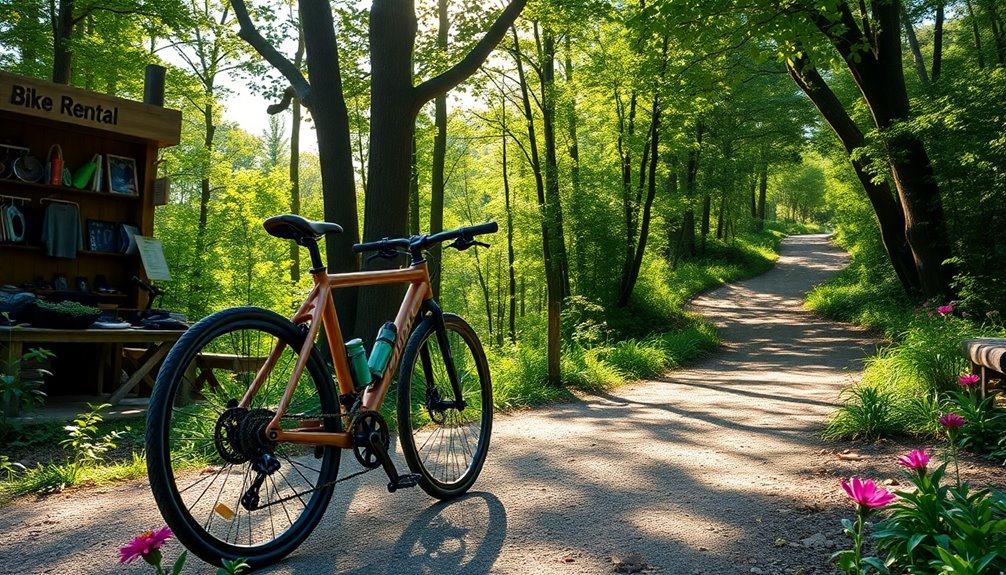
Renting a bike can considerably reduce your ecological footprint while traveling.
Choosing to rent instead of buy is a sustainable choice that minimizes the demand for new bike manufacturing, which can be resource-intensive.
Plus, renting supports local economies by helping community bike shops thrive.
Here are some environmentally friendly options to take into account:
- Renting Well-Maintained Bikes: Test various models without the commitment of a purchase.
- Buying Second-Hand Bikes: Extend the lifecycle of existing products, reducing waste.
- Choosing Eco-Friendly Brands: Opt for bikes made from sustainable materials like bamboo.
Additionally, using multi-functional gear can enhance your biking experience and reduce the need for additional equipment.
Finding Eco-Conscious Accommodations
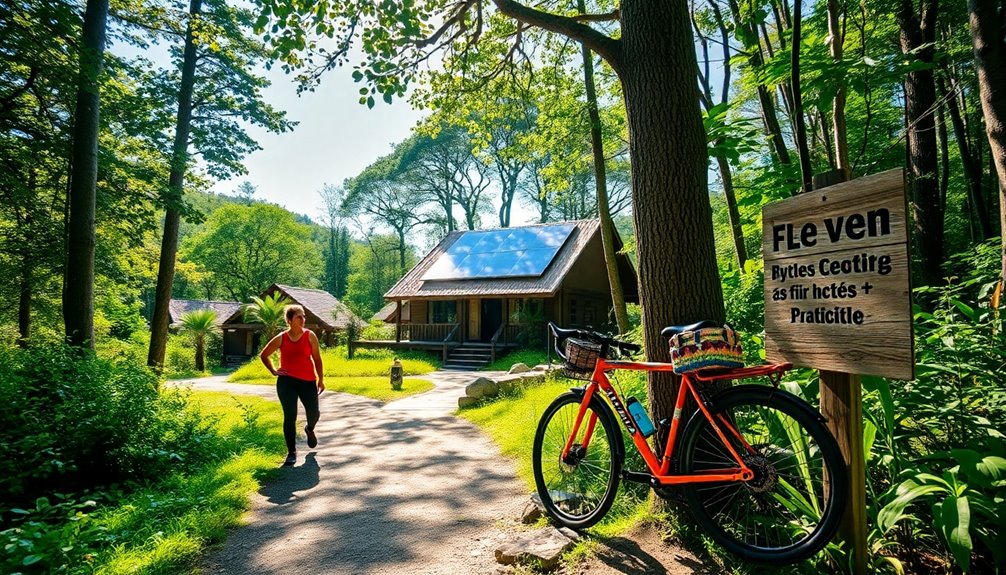
When you're planning your eco-friendly trip, finding sustainable lodging options is key.
Look for places that offer eco-friendly amenities, like solar energy or water conservation systems, to enhance your experience.
Choosing accommodations that align with your values not only supports the environment but also connects you with the local community.
Sustainable Lodging Options
Finding the right place to stay can enhance your eco-tourism experience while minimizing your environmental impact.
By opting for sustainable lodging options, you not only support the local economy but also embrace responsible travel practices.
Here are three ways to choose eco-conscious accommodations:
- Look for eco-certifications like LEED or Green Key, ensuring the place follows environmentally friendly practices.
- Select establishments with energy-efficient measures, such as solar power and water conservation systems, to reduce resource consumption.
- Consider bicycle-friendly accommodations that provide secure bike storage and access to cycling routes, making your travel experience even more enjoyable. Additionally, seek out accommodations that incorporate sustainable materials in their construction and decor to further enhance your eco-conscious stay.
Eco-Friendly Amenities Available
Choosing eco-friendly accommodations means you'll encounter a variety of amenities designed to enhance your experience while supporting sustainability. Many lodgings feature energy-efficient systems like solar panels and low-flow water fixtures to minimize resource consumption.
You'll also find sustainable materials, such as bamboo and reclaimed wood, utilized in their construction and furnishings.
Plus, many guesthouses and small hotels engage in waste reduction practices, like composting organic waste and reducing single-use plastics.
If you're biking, look for bike-friendly amenities, including secure bike storage and repair stations, which cater specifically to eco-tourists.
Supporting Local Economies Through Responsible Tourism

By embracing eco-tourism on bikes, you not only enjoy the beauty of your surroundings but also play an essential role in supporting local economies.
Your bike tour encourages sustainable practices that directly benefit local populations. Here's how:
- Increased Spending: Cyclists often spend up to 30% more on food and lodging at local businesses, boosting the economic impact of your visit.
- Job Creation: Engaging with bike-friendly initiatives can create up to 15% more employment opportunities in tourism-related sectors.
- Support for Local Goods: You're more likely to purchase locally sourced food and artisan goods, reducing the carbon footprint and enhancing the community's economy.
Additionally, your choice to bike promotes renewable energy technologies, which can further reduce the environmental impact of tourism.
Your choice to bike not only enriches your experience but also fosters a thriving local economy.
Traveling Without Leaving a Trace
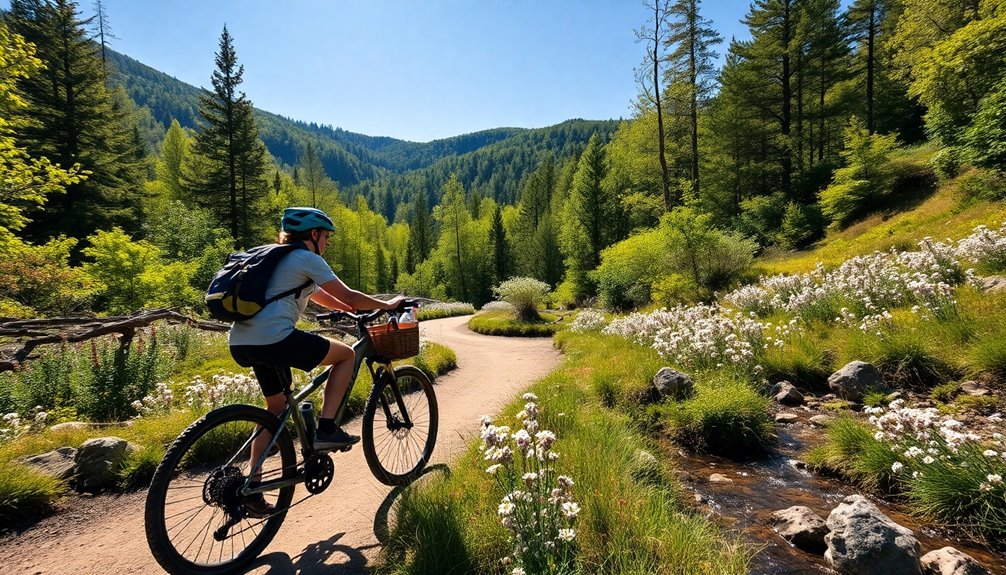
Traveling sustainably on a bike means leaving nothing but tire tracks behind.
To travel responsibly, it's essential to practice Leave No Trace principles. Always pack out all waste, ensuring you maintain the integrity of natural areas while minimizing your impact on the environment.
Avoid creating open-air public toilets, as even biodegradable waste can disrupt ecosystems. Respect local wildlife by keeping a safe distance and not disturbing their habitats.
When shopping, use reusable bags to cut down on plastic waste, further enhancing your sustainable travel experience.
Additionally, choose biking routes that minimize ecological disturbance, supporting the preservation of local ecosystems and benefiting the local people you encounter along the way. Consider bringing along portable camping toilets to ensure you can maintain hygiene without impacting the environment.
Best Practices for Planning Your Bike Tour
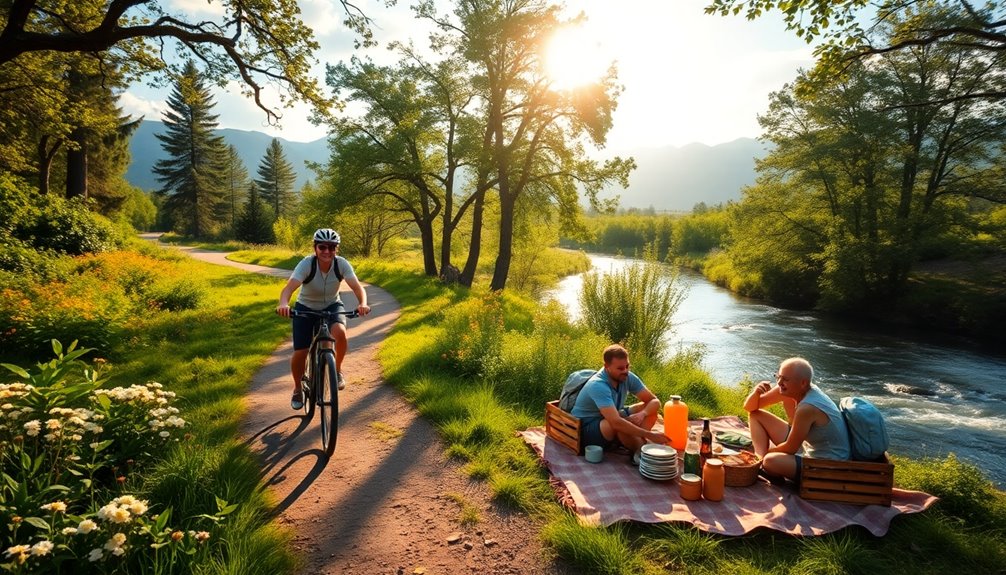
Planning a bike tour is an exciting opportunity to explore new landscapes while committing to sustainable practices.
To guarantee your adventure has a positive environmental impact, consider these best practices:
- Choose Eco-Friendly Routes: Select paths that highlight natural beauty and have low ecological disturbance.
- Pack Sustainably: Use biodegradable products and reusable water bottles to minimize waste and support local ecosystems.
- Follow Leave No Trace Principles: Always pack out what you bring in, stick to marked trails, and educate others about preserving nature.
Engaging With Local Communities During Your Journey
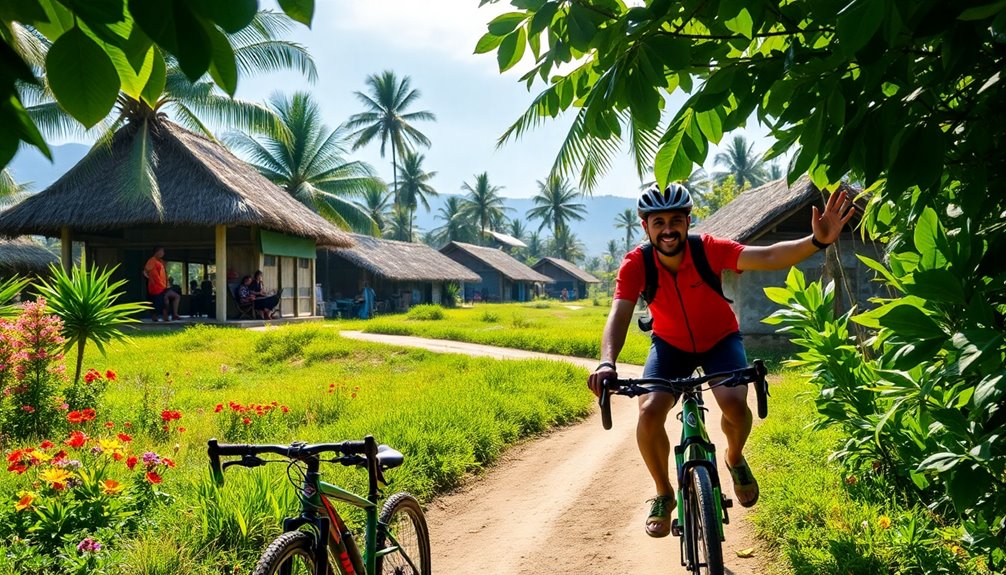
How can you make the most of your bike tour while connecting with local communities? Bicycling tours offer a unique chance to engage with residents and explore their cultural heritage.
By interacting with locals, you'll gain insights into traditional farming methods and local history, fostering a deeper understanding of their challenges and environmental issues. Supporting small shops and restaurants along your route directly boosts local economies, enhancing community engagement.
Consider participating in community projects that combine your cycling adventures with conservation efforts, showcasing your commitment to environmental stewardship. Your presence can inspire locals to embrace biking for health and community involvement. Additionally, you might discover opportunities to join internal company hackathons, which often encourage collaboration and innovation in local settings.
Frequently Asked Questions
Is Ecotourism Responsible Travel?
Yes, ecotourism is responsible travel.
It emphasizes minimizing your environmental impact while engaging with local cultures. By choosing eco-friendly activities, you support conservation efforts and help local economies thrive.
It encourages you to make informed choices about your travel, ensuring that you respect natural habitats and wildlife.
When you prioritize sustainability in your travels, you contribute to preserving the planet for future generations while enjoying authentic experiences.
Is It Eco Friendly to Ride a Bike?
Imagine a serene forest, where the whispering trees share secrets only with those who tread lightly.
Riding a bike is eco-friendly; it lets you glide through nature without leaving a trace. You're not just pedaling; you're reducing carbon footprints, conserving energy, and improving air quality.
Every mile you cycle breathes life into the environment, while cars choke it. So grab your bike, embrace the journey, and become a guardian of the earth's beauty.
What Are the Responsibilities of Ecotourism?
When engaging in ecotourism, you've got some important responsibilities. You should minimize your environmental impact by choosing sustainable transportation and respecting wildlife habitats.
Supporting local communities is vital, so consider buying from small businesses you encounter.
It's important to leave no trace and prioritize sustainable gear to reduce waste.
Finally, participating in conservation efforts or educational programs will enhance your understanding of local ecosystems and help promote responsible stewardship in the areas you visit.
What Is Eco Tourism Responsible Tourism?
Eco-tourism and responsible tourism go hand in hand.
When you choose eco-tourism, you're committing to travel in a way that respects the environment, supports local communities, and preserves cultural heritage.
It means making conscious decisions about where you stay, what you eat, and how you interact with nature.
By prioritizing sustainability, you help protect the destinations you visit, ensuring they thrive for future generations.
You're not just a traveler; you're a steward of the earth.
Conclusion
In a world bursting with travel options, choosing to bike can feel like a refreshing change amid the chaos. By pedaling through local landscapes, you not only reduce your carbon footprint but also immerse yourself in vibrant communities. As you roll past bustling markets and serene trails, remember that each turn of the wheel supports sustainable practices. So, embrace the journey, connect with nature, and leave only tire tracks behind—your adventure awaits!
